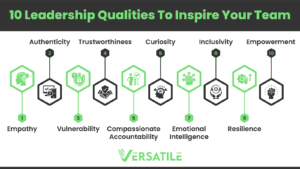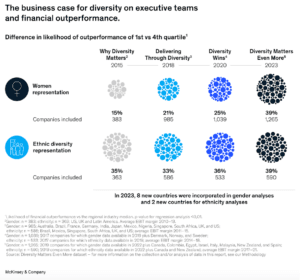The Top 10 Human-Centred Leadership Qualities to Inspire Your Team
Leadership isn’t just about titles or responsibilities; it’s a profound commitment to uplift others, create trust, and build a work environment where people thrive. Leaders today need to connect with authenticity, empathy, and courage—qualities that create a culture of support and growth. Here are ten leadership qualities that place people at the heart of success, along with actionable steps to help leaders develop each quality.

1. Empathy
Why Empathy is Essential for Leaders
Empathy involves understanding others’ emotions, thoughts, and experiences. Leaders who lead with empathy can connect on a human level, creating trust and enhancing collaboration.
Example in Action:
- A team member is going through a difficult time. Instead of focusing only on work outcomes, an empathetic leader checks in regularly, offering support and making temporary adjustments to the workload.
How to Develop Empathy:
- Practise active listening and ask open-ended questions to truly understand your team’s needs.
A simple way to practise empathy and active listening is by controlling your urge to help your team members fix their problems. Very often, people just want to be heard and seen. You can also simply ask your team member what they would like to get out of this conversation:
- seek help or advice
- just wants to vent or have their opinions heard
- to have someone empathise with their situation
2. Authenticity
The Power of Authentic Leadership
Authentic leaders are transparent, genuine, and true to their values. This honesty fosters a workplace culture of openness and psychological safety.
Example in Action:
- A leader shares their own challenges in adapting to change, encouraging their team to discuss their concerns without fear of judgement.
How to Cultivate Authenticity:
- Reflect on your core values and ensure your actions align with them consistently.
As a leader, you set the culture of your team. By first being open about your own struggles, your employees will feel safe about opening up about their own struggles as well.
3. Vulnerability
Why Vulnerability is Strength in Leadership
Vulnerability means showing up as yourself, without needing to be ‘perfect’. This courage to be imperfect allows teams to relate to their leaders and feel safe being themselves.
Example in Action:
- A leader openly acknowledges they don’t have all the answers but are committed to finding solutions together with their team.
Developing Vulnerability:
- Practise sharing your experiences honestly and encourage open communication.
When a leader practises vulnerability at the workplace, it can create a safe space for employees to learn, grow, and develop to their full potential. They can be honest about their thoughts and are not afraid to make suggestions that can benefit the team and organisation at large because they know they will not be ridiculed for their suggestions or thoughts.
4. Trustworthiness
Building Trust through Integrity
Trust is the foundation of any strong team. Leaders who demonstrate integrity and follow through on commitments build trust that enables effective collaboration.
Example in Action:
- A leader admits to a mistake and takes responsibility, reinforcing a culture where honesty is valued over perfection.
How to Build Trustworthiness:
- Be reliable in small commitments, and communicate openly about setbacks.
A building block of trust is about the true intentions of a person – does my leader want me to take on this difficult undertaking because he thinks it will stretch and help me develop as an individual, or does he want me to take it because he doesn’t want to do it himself? When your team members question your true intentions – that’s when you know their trust in you is under threat.
5. Compassionate Accountability
Why Accountability Needs Compassion
Accountability doesn’t have to mean rigidity; when balanced with compassion, it motivates teams without fear. Leaders who practise compassionate accountability inspire personal responsibility and mutual respect.
Example in Action:
- When a project falls short, a leader encourages the team to reflect on learnings rather than dwell on errors, turning it into an opportunity for growth.
Practising Compassionate Accountability:
- Set clear expectations but create room for honest dialogue about challenges and learning moments.
The buck stops with you. Your job as a leader is to help your team members be the best version of themselves. People perform at their best when they feel safe – and that means having a leader that will not put them under the bus when something goes south.
6. Curiosity
How Curiosity Drives Learning and Growth
Curiosity opens doors to innovation, exploration, and new perspectives. Leaders who ask questions rather than give directives create a learning environment that empowers others.
Example in Action:
- Instead of pushing a single solution, a leader invites team members to brainstorm and share ideas freely.
Cultivating Curiosity:
- Embrace questions and encourage a culture where learning is constant.
Consider picking up the skill of coaching – a leader skilled in coaching can help create a culture of curiosity and creativity in their organisations by facilitating their team members in exploring their ideas and generating new, innovative solutions.
7. Emotional Intelligence
Why EQ is Key to Effective Leadership
Emotional intelligence allows leaders to manage their own emotions while understanding others’. This balance improves decision-making and conflict resolution.
Example in Action:
- A leader reads the room during a tense meeting and uses calming techniques to defuse stress and encourage constructive discussion.
Building EQ:
- Practise mindfulness and regularly check in with your emotional state to understand how it influences your actions.
While leaders take on the mantle to care for their team members, they must not forget to take care of themselves too. One way that a leader can build EQ and alleviate their own stress levels is through Mindfulness Based Stress Reduction. A heightened awareness and regulation of their thoughts and emotions can help build better interpersonal skills and empathy.

Source: Versatile Courses
8. Inclusivity
Inclusive Leadership Creates Belonging
Inclusive leaders celebrate diversity, value every voice, and cultivate an environment where everyone feels they belong.
Example in Action:
- A leader actively encourages quieter team members to share their thoughts, ensuring that all perspectives are represented in decision-making.
Developing Inclusivity:
- Foster a culture where all contributions are welcomed and celebrated.
Diversity and inclusion is not just a feel-good factor. A McKinsey report has found that Companies committed to diversity and inclusion has a 39% increased likelihood to outperform companies that aren’t.

Source: Mckinsey
9. Resilience
Resilience as a Source of Strength and Inspiration
Resilience enables leaders to guide teams through adversity with optimism and persistence. Resilient leaders model perseverance, motivating others to push through challenges.
Example in Action:
- In the face of a setback, a leader openly shares their strategies for staying positive and adaptable, inspiring the team to keep going.
Building Resilience:
- Focus on long-term goals and create strategies to turn setbacks into opportunities for growth
It’s easy to fall into thinking traps when things don’t go our way. That’s when you start being too hard on yourself for things that may be outside of your control. In the field of Positive Psychology, building a resilient mindset helps to bounce back from these challenges and recover with minimal negative impact. While resilience resists shocks and remains unchanged, antifragility improves and grows stronger from adversity.

Source: Versatile Courses
10. Empowerment
Empowerment Leads to Growth and Autonomy
Empowered leaders build up others to lead in their own right. By delegating responsibility and showing trust, leaders inspire confidence and ownership.
Example in Action:
- A leader encourages a team member to take on a challenging project, providing guidance but allowing autonomy.
Practising Empowerment:
- Delegate meaningful tasks and provide support rather than direction.
An employee feels empowered only when they feel safe and supported by their leaders. A leader needs to create that safe space, by practising all the qualities in this article. Do not be mistaken – no one expects a leader to be perfect, and no one can be. But the role of a leader is to lead, and that very often means having the courage to take the first step to improve yourself, and to be 1% better everyday.
By embracing these human-centred leadership qualities, leaders not only achieve results but also create a supportive, high-performing culture where people feel valued, trusted, and motivated to do their best work. True leadership is about guiding others to realise their full potential while cultivating a shared commitment to growth and success.
Incorporate these human-centred leadership qualities into your own leadership journey to cultivate a high-performing team where individuals feel valued, empowered, and motivated. If you’re ready to deepen your understanding and practice of effective leadership, consider joining our comprehensive Leadership Course. This course provides valuable insights and practical strategies to build authentic connections, inspire resilience, and drive meaningful impact within your team. Start your journey towards becoming the leader your team needs.

Reader Interactions